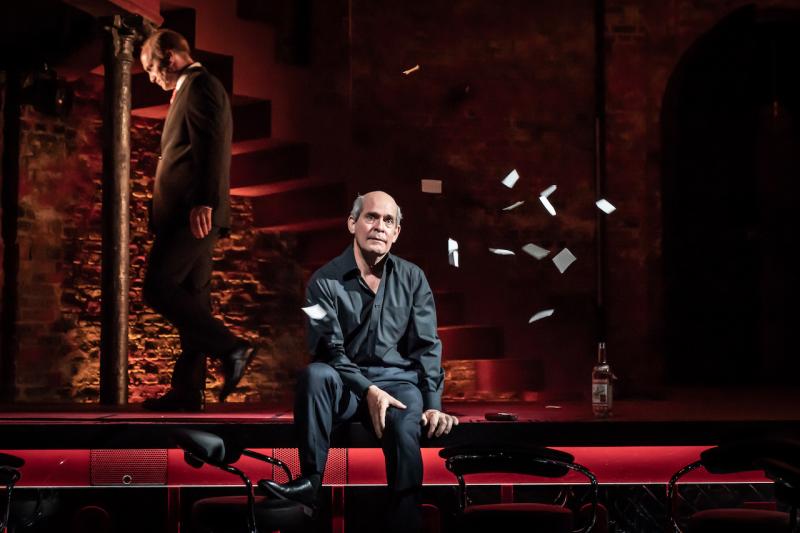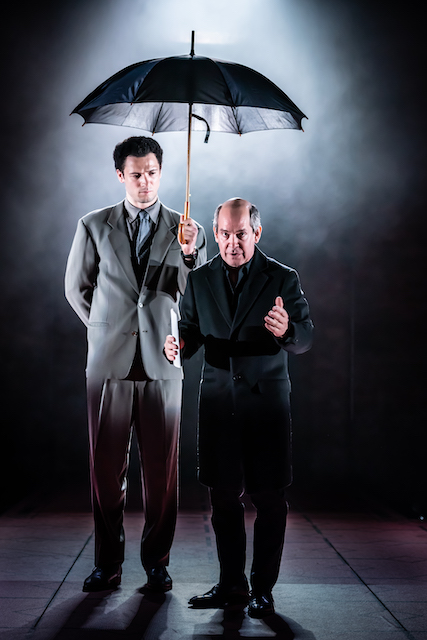Patriots, Almeida Theatre review - a brilliant drama from Peter Morgan about rampant Russian power games | reviews, news & interviews
Patriots, Almeida Theatre review - a brilliant drama from Peter Morgan about rampant Russian power games
Patriots, Almeida Theatre review - a brilliant drama from Peter Morgan about rampant Russian power games
Tom Hollander as powerbroker Boris Berezovsky switches between brazen charm and hubristic rage

To watch a Peter Morgan drama is to have a fly-on-the-wall’s perspective of modern history. Over the last two decades he has chronicled everything from David Frost’s bid to interview Richard Nixon to the disintegration in the relationship between Gordon Brown and Tony Blair.
In his new play Patriots at the Almeida he takes one of the most potent political narratives of our time – the rise of Vladimir Putin – and refracts it through the life story of the brilliant, flamboyant, bullying oligarch Boris Berezovsky. Through the prism of Berezovsky’s tragedy we see how Putin goes from repressed bureaucrat to a leader who clamps down ruthlessly on any individual – or country – he perceives to have betrayed him.
The challenge of telling a story with such a strong contemporary resonance is to do it in a way that evades audience preconceptions. While Putin’s villain status is a given, what Morgan cleverly demonstrates from the start is how impossible it is for a Westerner truly to understand Russia and, by implication, what it takes to control it. Part of this is scale – where in the UK we live within one time zone, Russia spans an astonishing 11; it has 120 ethnic groups and more than three quarters of its landmass is in Asia. Part of this is to do with the culture, whether it’s – as Berezovsky tells us – the songs of Vladimir Vysotsky championing the ordinary man’s endurance against the indignities of life, laughter in the banya, or the beauty of snow on the rooftops.
Rupert Goold’s assured production shifts deftly between Berezovksy’s childhood (in which he’s revealed as a maths genius), scenes of McMafia-style excess in which he lords it as a billionaire, and encounters with both Putin and his erstwhile ally Roman Abramovich that show his power gradually being eroded. In a performance that's as high-octane as it's darkly comic, Tom Hollander establishes Berezovsky as a man who is equally cynical and persuasive, switching between brazen charm and hubristic temper tantrums as he accrues wealth through cars, the media industry and oil successively.
While we see how success makes him a monster, we see too the strange naïvety to his rampant power games. “It’s a foolish man who refuses to see his President,” Putin castigates him at one point. “Not when he’s created that president,” retorts Berezovsky. Yet as the evening progresses and Putin’s vicelike grip tightens, those who have shunned Berezovsky start to realise he is the lesser of two evils. Once he’s “betrayed” Putin by broadcasting the true facts about the Kursk submarine disaster, it’s not just Berezovksy but those around him who see how the country is stumbling back to totalitarianism.
 Hollander’s performance as Berezovsky is offset by a performance of pure brilliance by Will Keen as Vladimir Putin. It would be all too easy to caricature him, but Keen’s understanding of the man informs his every muscle movement, whether in the rigidity of his torso, the saccadic shifts of the muscles round the eyes, or the twitching of his fingers. We perceive straight away the radioactive rage of an individual who has internalised every perceived humiliation both of himself and his country and has devised a strategy to ensure he will never be humiliated again. One particularly interesting moment is the reference to Putin’s desire to join NATO in 2000, with the implication that the West’s reluctance to engage with the concept of this contributed in no small part to the situation we are witnessing today.
Hollander’s performance as Berezovsky is offset by a performance of pure brilliance by Will Keen as Vladimir Putin. It would be all too easy to caricature him, but Keen’s understanding of the man informs his every muscle movement, whether in the rigidity of his torso, the saccadic shifts of the muscles round the eyes, or the twitching of his fingers. We perceive straight away the radioactive rage of an individual who has internalised every perceived humiliation both of himself and his country and has devised a strategy to ensure he will never be humiliated again. One particularly interesting moment is the reference to Putin’s desire to join NATO in 2000, with the implication that the West’s reluctance to engage with the concept of this contributed in no small part to the situation we are witnessing today.
Is this true, or is this yet another of the foreign policy mind games at which Putin has proved himself so adept? It’s not in the play’s remit to explore this; what it does do instead is show how the seeds of totalitarianism were planted right at the start. In the list of individuals who Putin summons to Stalin’s dacha to inform them how politics has changed, we recognise the name of the subsequently assassinated Boris Nemtsov and the imprisoned, then exiled Mikhail Khodorkovsky. We also witness the shock as the assassination of Alexander Litvinenko – Berezovsky’s associate – by polonium reveals that Russia feels confident enough to treat even London as a city where it can act with murderous impunity.
Miriam Buether’s simple versatile design deploys a thrust stage that doubles up as a bar and a political “catwalk” on which the different players chance their luck. An arched doorway at the back opens to reveal a mirror that amplifies the narcissism of power-play in an oil-rich post-communist world. Among the rest of the cast Luke Thallon stands out as a deceptively wet-behind-the-ears Roman Abramovich, while Jamael Westman is a compelling Litvinenko (pictured above, left with Tom Hollander). Once more Morgan has created a drama that is as politically intelligent as it is entertaining, even as it comes with the chilling subtext that we have no idea how it will end for any of us.
rating
Explore topics
Share this article
The future of Arts Journalism
You can stop theartsdesk.com closing!
We urgently need financing to survive. Our fundraising drive has thus far raised £49,000 but we need to reach £100,000 or we will be forced to close. Please contribute here: https://gofund.me/c3f6033d
And if you can forward this information to anyone who might assist, we’d be grateful.

Subscribe to theartsdesk.com
Thank you for continuing to read our work on theartsdesk.com. For unlimited access to every article in its entirety, including our archive of more than 15,000 pieces, we're asking for £5 per month or £40 per year. We feel it's a very good deal, and hope you do too.
To take a subscription now simply click here.
And if you're looking for that extra gift for a friend or family member, why not treat them to a theartsdesk.com gift subscription?
more Theatre
 Ghost Stories, Peacock Theatre review - spirited staging but short on scares
Impressive spectacle saves an ageing show in an unsuitable venue
Ghost Stories, Peacock Theatre review - spirited staging but short on scares
Impressive spectacle saves an ageing show in an unsuitable venue
 Hamlet, National Theatre review - turning tragedy to comedy is no joke
Hiran Abeyeskera’s childlike prince falls flat in a mixed production
Hamlet, National Theatre review - turning tragedy to comedy is no joke
Hiran Abeyeskera’s childlike prince falls flat in a mixed production
 Rohtko, Barbican review - postmodern meditation on fake and authentic art is less than the sum of its parts
Łukasz Twarkowski's production dazzles without illuminating
Rohtko, Barbican review - postmodern meditation on fake and authentic art is less than the sum of its parts
Łukasz Twarkowski's production dazzles without illuminating
 Lee, Park Theatre review - Lee Krasner looks back on her life as an artist
Informative and interesting, the play's format limits its potential
Lee, Park Theatre review - Lee Krasner looks back on her life as an artist
Informative and interesting, the play's format limits its potential
 Measure for Measure, RSC, Stratford review - 'problem play' has no problem with relevance
Shakespeare, in this adaptation, is at his most perceptive
Measure for Measure, RSC, Stratford review - 'problem play' has no problem with relevance
Shakespeare, in this adaptation, is at his most perceptive
 The Importance of Being Earnest, Noël Coward Theatre review - dazzling and delightful queer fest
West End transfer of National Theatre hit stars Stephen Fry and Olly Alexander
The Importance of Being Earnest, Noël Coward Theatre review - dazzling and delightful queer fest
West End transfer of National Theatre hit stars Stephen Fry and Olly Alexander
 Get Down Tonight, Charing Cross Theatre review - glitz and hits from the 70s
If you love the songs of KC and the Sunshine Band, Please Do Go!
Get Down Tonight, Charing Cross Theatre review - glitz and hits from the 70s
If you love the songs of KC and the Sunshine Band, Please Do Go!
 Punch, Apollo Theatre review - powerful play about the strength of redemption
James Graham's play transfixes the audience at every stage
Punch, Apollo Theatre review - powerful play about the strength of redemption
James Graham's play transfixes the audience at every stage
 The Billionaire Inside Your Head, Hampstead Theatre review - a map of a man with OCD
Will Lord's promising debut burdens a fine cast with too much dialogue
The Billionaire Inside Your Head, Hampstead Theatre review - a map of a man with OCD
Will Lord's promising debut burdens a fine cast with too much dialogue
 50 First Dates: The Musical, The Other Palace review - romcom turned musical
Date movie about repeating dates inspires date musical
50 First Dates: The Musical, The Other Palace review - romcom turned musical
Date movie about repeating dates inspires date musical

Add comment